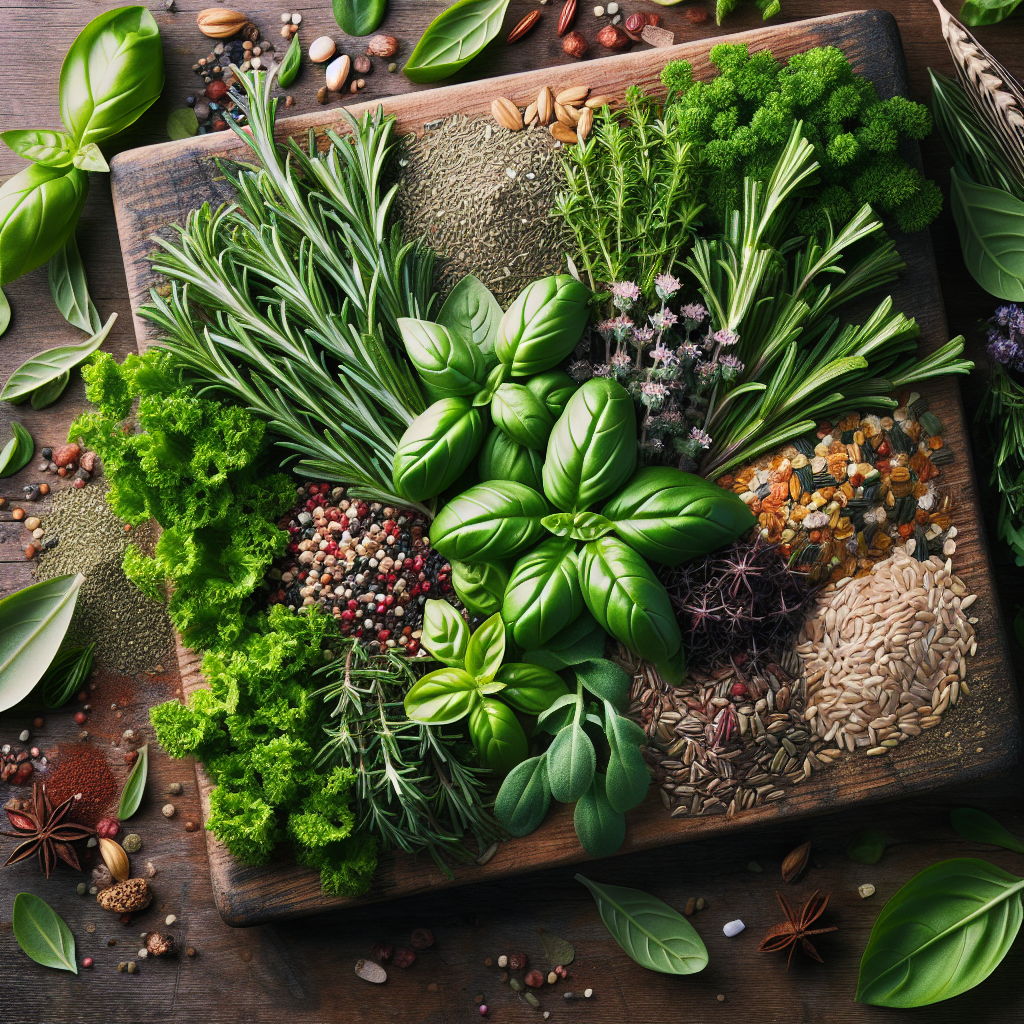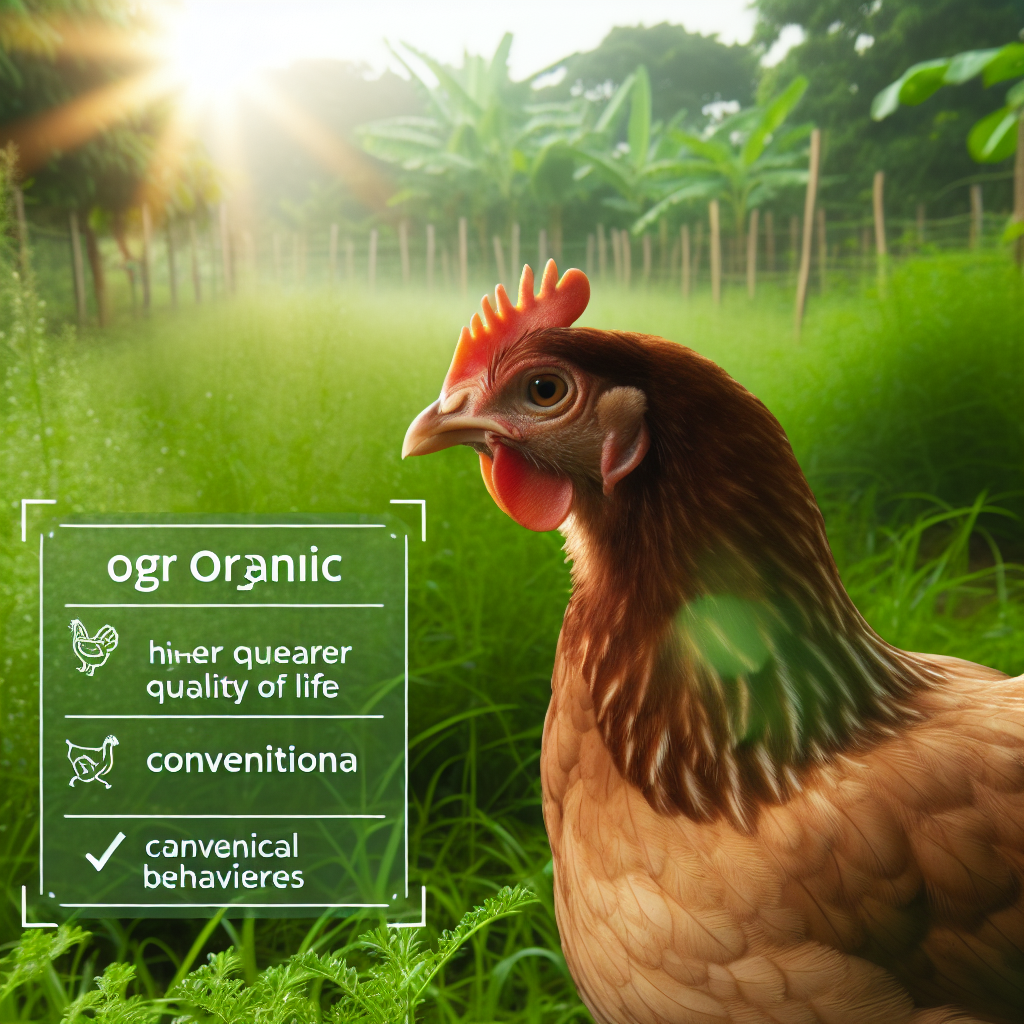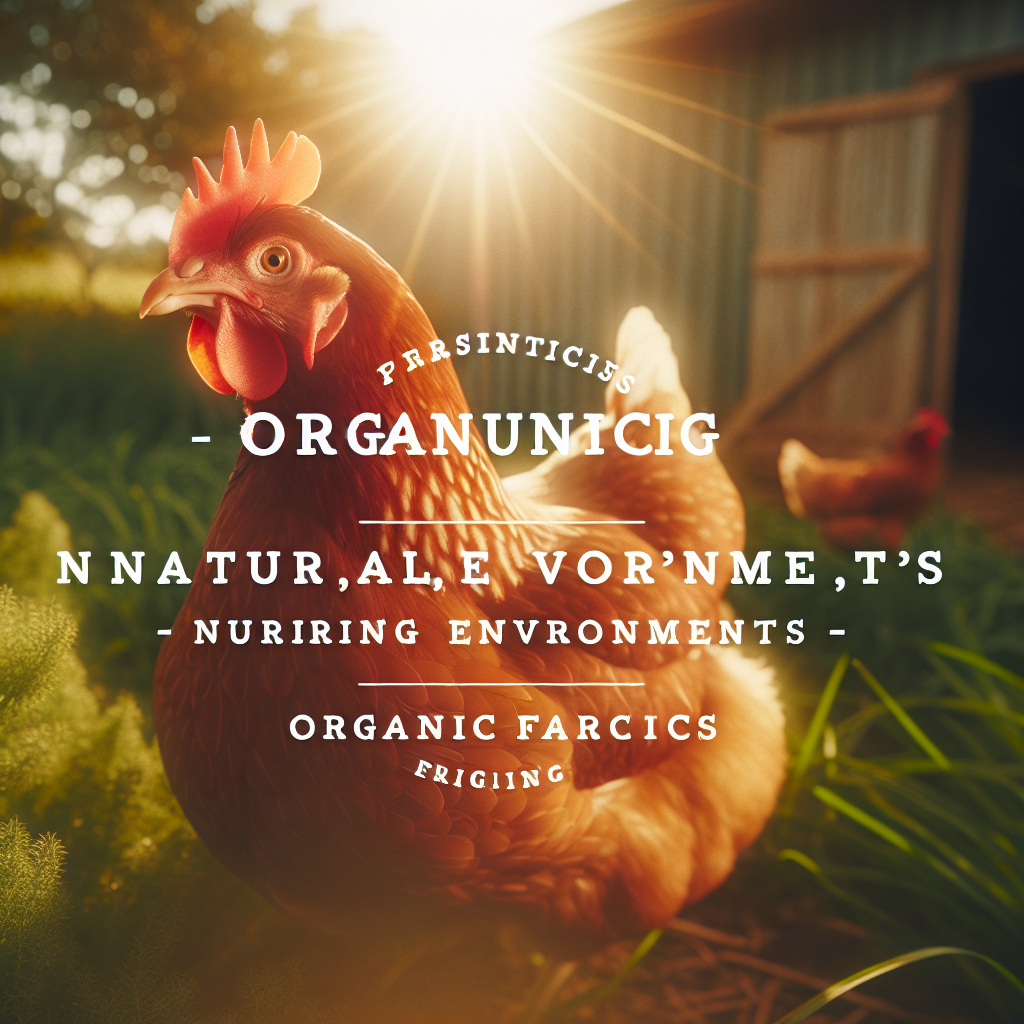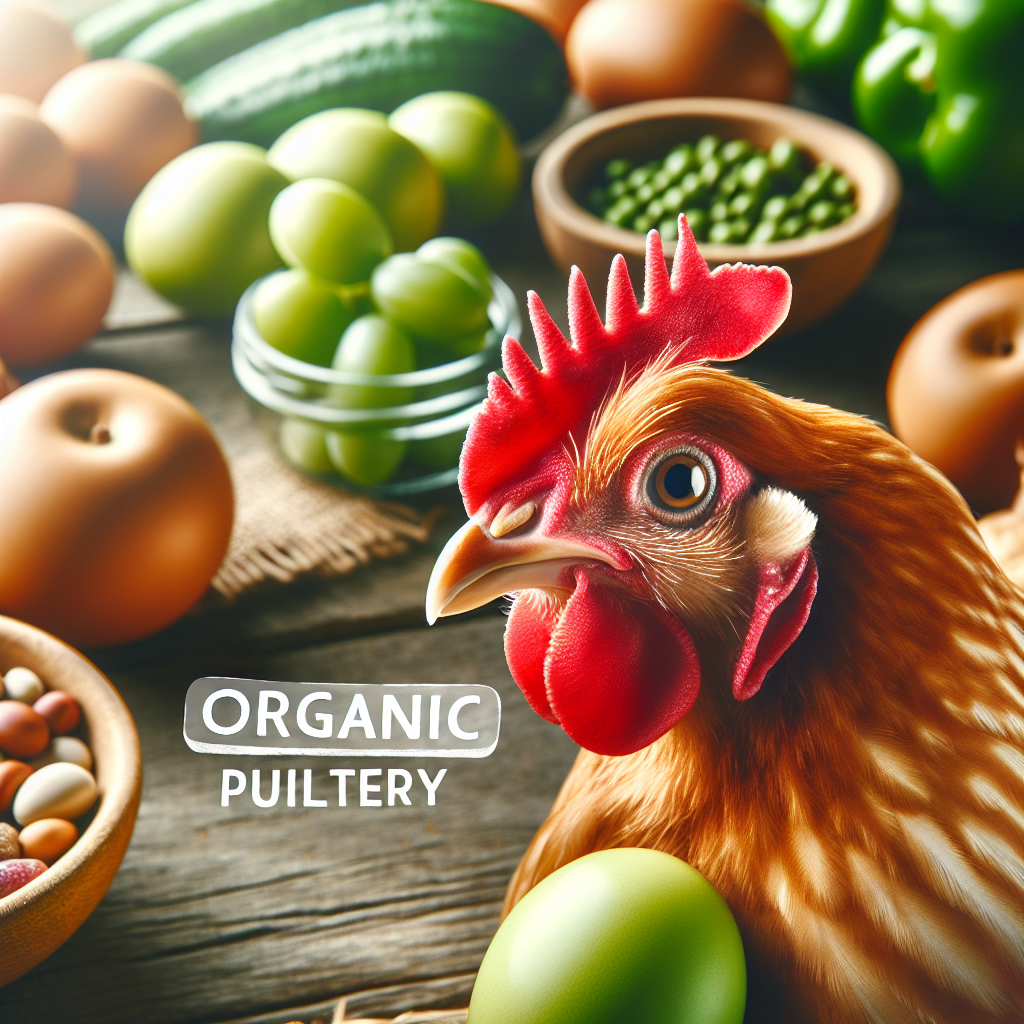If you’re looking to provide your organically raised chickens with the best care and nutrition options, you may be wondering what natural supplements or feed additives are recommended. Ensuring the well-being of your feathered friends is crucial, and incorporating natural solutions into their diet can have numerous benefits. In this article, we will explore some of the most highly recommended natural supplements and feed additives that can help optimize the health and productivity of your organically raised chickens. So, let’s dive in and discover the secret to happy and thriving chickens!
Probiotics
Introduction to Probiotics
Probiotics are beneficial microorganisms that can support the overall health and well-being of chickens. These beneficial bacteria help maintain a healthy gut environment, improve digestion, and enhance the immune system. They play a vital role in preventing the overgrowth of harmful bacteria in the intestinal tract, which can lead to various health issues in chickens. Incorporating probiotics into the diet of organically raised chickens can contribute to their overall health and productivity.
Benefits of Probiotics for Chickens
The use of probiotics in organic poultry farming has several benefits for chickens. Firstly, probiotics enhance gut health by creating a favorable environment for beneficial bacteria to thrive, which aids in digestion and nutrient absorption. This can lead to improved feed conversion, ultimately maximizing the use of nutrients from the diet. Additionally, probiotics can help strengthen the immune system of chickens, making them more resistant to diseases. Moreover, these beneficial microorganisms can reduce the incidence of bacterial infections and promote optimal intestinal balance. Probiotics can also support the development of a robust microbial ecosystem in the chicken’s gut, which is essential for overall well-being.
Types of Probiotics for Organically Raised Chickens
There are various types of probiotics that can be used for organically raised chickens. Lactobacillus and Bifidobacterium are commonly used strains of probiotics for poultry. These bacteria can colonize the gut and improve gut health by inhibiting the growth of harmful pathogens. Other effective strains include Bacillus subtilis, Enterococcus faecium, and Saccharomyces cerevisiae. Probiotics can be fed to chickens in the form of powders, liquids, or pellets.
Recommended Dosage and Administration
The dosage and administration of probiotics for chickens depend on various factors, including the age of the birds, the health status, and the specific probiotic product used. It is recommended to follow the manufacturer’s instructions and consult with a veterinarian or poultry nutritionist for guidance. Generally, probiotics can be administered through the chicken’s drinking water or mixed in their feed. Regular supplementation of probiotics is essential to maintain a healthy gut environment and maximize the benefits for organically raised chickens.
Herbs and Plants
Introduction to Herbs and Plants
Herbs and plants are valuable additions to the diet of organically raised chickens. They offer a wide range of nutritional and medicinal benefits, contributing to the overall health and well-being of the birds. Incorporating herbs and plants into the diet of chickens allows them to obtain essential nutrients and bioactive compounds naturally, without relying solely on synthetic supplements.
Benefits of Herbs and Plants for Chickens
Including herbs and plants in the diet of organically raised chickens provides numerous benefits. These natural ingredients are rich in essential vitamins, minerals, and antioxidants, which can support optimal growth, reproduction, and overall vitality. For example, certain herbs like oregano, thyme, and garlic contain antimicrobial properties that can help combat bacterial infections in chickens. Additionally, herbs like dandelion and nettle have detoxifying effects and can improve liver function in chickens. Herbs and plants also offer natural sources of minerals, such as calcium from dandelion greens and iron from nettle.
Commonly Used Herbs and Plants in Organic Poultry Farming
There is a wide variety of herbs and plants that are commonly used in organic poultry farming. Some popular choices include oregano, thyme, garlic, lavender, nettle, dandelion, and parsley. These herbs and plants can be provided fresh, dried, or as extracts. They can be added to the chicken’s feed, incorporated into herbal teas or infusions, or used in the form of essential oils.
Methods of Administration
Herbs and plants can be administered to chickens in various ways. For fresh or dried herbs, they can be added directly to the chicken’s feed to enhance its nutritional value and provide added flavor. Some herbs can be steeped in hot water to create herbal teas or infusions, which can be added to the drinking water of chickens. Essential oils derived from herbs can also be diluted and used for aromatherapy or applied topically for certain conditions. It is important to ensure that the herbs and plants used are safe for chickens and dosages are appropriate.
Vitamins and Minerals
Importance of Vitamins and Minerals for Chickens
Vitamins and minerals are essential nutrients that play a crucial role in the health and development of organically raised chickens. They are involved in various physiological processes and are necessary for proper growth, reproduction, and overall vitality. A deficiency in vitamins and minerals can lead to poor feathering, weak bones, reduced egg production, and increased susceptibility to diseases. Providing chickens with adequate amounts of vitamins and minerals is crucial for maintaining their well-being.
Key Vitamins and Minerals for Organic Chicken Health
Several key vitamins and minerals are particularly important for organic chicken health. Vitamin A is essential for vision, growth, and immune function. Vitamin D is necessary for calcium absorption and bone health. Vitamin E acts as an antioxidant and supports the immune system. B vitamins, including B12, are involved in energy metabolism and nervous system function. Minerals such as calcium, phosphorus, and magnesium are critical for bone development and eggshell formation. Zinc, iron, and copper are necessary for enzyme activities and immune function.
Natural Sources of Vitamins and Minerals
There are various natural sources of vitamins and minerals that can be incorporated into the diet of organically raised chickens. Fresh fruits and vegetables, such as carrots, spinach, and berries, are rich in vitamins and antioxidants. Leafy greens like kale and chard provide essential minerals, including calcium and magnesium. Additionally, certain seeds and nuts, like flaxseeds and sunflower seeds, offer a range of vitamins and minerals. Ensuring a diverse and balanced diet for chickens will help provide them with an array of natural sources of vitamins and minerals.
Supplementing and Balancing Diets
Supplementing the diet of organically raised chickens with additional vitamins and minerals may be necessary to ensure optimal health. This can be achieved through the use of vitamin and mineral supplements specifically formulated for chickens. These supplements can be added to the feed or provided separately. It is important to consult with a poultry nutritionist or veterinarian to determine the appropriate dosage and ensure the diet is well-balanced. Regular monitoring of the chickens’ health and performance can help assess the effectiveness of the vitamin and mineral supplementation.
Essential Oils
Introduction to Essential Oils
Essential oils are highly concentrated natural extracts derived from plants. They have been used for various purposes, including aromatherapy, medicinal applications, and as natural additives in organic poultry farming. Essential oils can provide several benefits for chickens, including promoting a healthy respiratory system, supporting immune function, and acting as natural insect repellents.
Benefits of Essential Oils for Chickens
Essential oils offer several benefits for chickens in organic poultry farming. Some essential oils, such as eucalyptus and tea tree oil, have antimicrobial properties that can help maintain a healthy respiratory system and prevent respiratory infections. Others, like lavender and chamomile, have calming effects and can reduce stress in chickens. Essential oils can also act as natural insect repellents, helping to protect chickens from external parasites like mites and lice. Moreover, certain essential oils, such as oregano and thyme oil, have antioxidant properties and contribute to overall immune support.
Commonly Used Essential Oils in Organic Poultry Farming
Several essential oils are commonly used in organic poultry farming. Oregano oil is known for its antimicrobial properties and can help maintain a healthy gut environment in chickens. Tea tree oil has potent antiparasitic effects and can be used to control external parasites. Lavender oil has soothing and calming properties, making it useful for reducing stress in chickens. Eucalyptus oil is often used to support respiratory health. These essential oils can be diluted and provided to chickens through aromatherapy, applied topically, or added to their bedding or coop environment.
Methods of Safe Application
Essential oils should be used with caution and in moderation when applying them to chickens. It is crucial to dilute essential oils properly before applying them topically or using them in aromatherapy. The methods of application can vary depending on the specific essential oil and purpose. For aromatherapy, essential oils can be diffused in the chicken’s environment using a suitable diffuser or added to their bedding. When applying essential oils topically, it is important to consult with a poultry veterinarian or expert to ensure proper dilution and safe application to avoid any potential adverse effects.
Seaweed and Algae
Importance of Seaweed and Algae for Chickens
Seaweed and algae offer valuable nutritional benefits for chickens in organic poultry farming. These aquatic plants are rich in essential vitamins, minerals, trace elements, and bioactive compounds, providing a natural and sustainable source of nutrition. Including seaweed and algae in the diet of organically raised chickens can have positive effects on their overall health, egg quality, and productivity.
Nutritional Benefits of Seaweed and Algae
Seaweed and algae are highly nutritious and offer a wide range of essential nutrients for chickens. They contain high levels of vitamins, including vitamin K, B vitamins, and beta-carotene, which contribute to optimal growth and reproduction. Additionally, seaweed and algae are rich in minerals, such as iodine, calcium, magnesium, and iron, which are necessary for bone development, eggshell quality, and overall vitality. Furthermore, these aquatic plants contain bioactive compounds like polysaccharides and antioxidants, which can support the immune system and combat oxidative stress in chickens.
Types of Seaweed and Algae Supplements
There are various types of seaweed and algae supplements that can be used for chickens. Common options include kelp, spirulina, and chlorella. Kelp is a type of brown seaweed that is often available in powdered or pellet form. Spirulina and chlorella are blue-green algae that are rich in protein, vitamins, and minerals. These supplements can be added to the chicken’s feed or provided separately. It is important to select high-quality seaweed and algae supplements that are specifically intended for poultry use.
Recommended Usage and Dosage
The recommended usage and dosage of seaweed and algae supplements for chickens may vary depending on their specific nutritional profile and the brand or product used. It is recommended to follow the manufacturer’s instructions and consult with a poultry nutritionist or veterinarian for guidance. Generally, seaweed and algae supplements can be added to the chicken’s feed at a rate of 2-5% of the total diet. Regular supplementation of these natural ingredients can contribute to enhanced nutrition and overall well-being of organically raised chickens.
Prebiotics
Introduction to Prebiotics
Prebiotics are non-digestible compounds that serve as food for beneficial gut bacteria. They play a crucial role in maintaining a healthy gut environment and supporting optimal digestion and nutrient absorption. Including prebiotics in the diet of organically raised chickens can promote a balanced gut microbiota, strengthen the immune system, and improve overall gut health.
Role of Prebiotics in Chicken Gut Health
Prebiotics act as nourishment for beneficial gut bacteria, stimulating their growth and activity. By promoting the growth of these beneficial bacteria, prebiotics help maintain a balanced gut microbiota, which is essential for optimal gut health. A healthy gut microbiota can efficiently break down complex carbohydrates, produce short-chain fatty acids, and prevent the overgrowth of harmful pathogens. This, in turn, improves digestion, maximizes nutrient absorption, and enhances the overall health and well-being of chickens.
Common Prebiotics for Organically Raised Chickens
There are several common prebiotics that can be used for organically raised chickens. Inulin, fructo-oligosaccharides (FOS), and mannan-oligosaccharides (MOS) are frequently used prebiotics in poultry nutrition. They are typically derived from natural sources such as chicory root, sugar beet pulp, and yeast cell walls. These prebiotics can be obtained in powdered or liquid form and added to the chicken’s feed or drinking water.
Feeding Strategies and Dosage
The feeding strategies and dosage of prebiotics for chickens depend on various factors, including the age of the birds, the health status, and the specific prebiotic product used. It is recommended to follow the manufacturer’s instructions and consult with a veterinarian or poultry nutritionist for proper guidance. Generally, prebiotics can be added to the chicken’s feed at a rate of 1-3% of the total diet. Regular supplementation, in combination with a balanced diet, can optimize the benefits of prebiotics for organically raised chickens.
Enzymes
Benefits of Enzymes for Chickens
Enzymes play a vital role in the digestion and utilization of nutrients in chickens. These biological catalysts help break down complex carbohydrates, proteins, and fats into simpler forms that can be easily absorbed by the chicken’s body. Adding enzymes to the diet of organically raised chickens can improve nutrient utilization, increase feed efficiency, and reduce the nutrient content of manure.
Types of Enzymes Used in Organic Poultry Nutrition
There are various types of enzymes used in organic poultry nutrition to enhance feed digestion and nutrient utilization. Amylases are enzymes that break down carbohydrates, while proteases break down proteins. Lipases aid in the digestion of fats, and phytases help break down phytic acid, a form of phosphorus found in plant-based feeds. These enzymes can be derived from microbial sources or produced through fermentation techniques.
Effects on Digestion and Nutrient Absorption
The inclusion of enzymes in the diet of organically raised chickens can have significant effects on digestion and nutrient absorption. By breaking down complex feed components, enzymes improve the availability of nutrients and enhance their absorption in the digestive tract. This leads to increased feed efficiency and improved growth performance in chickens. Furthermore, the use of enzymes can reduce the nutrient content of manure, minimizing environmental impact.
Recommended Inclusion Levels
The recommended inclusion levels of enzymes in the diet of organically raised chickens may vary depending on the specific enzyme and the type of feed used. It is important to consult with a poultry nutritionist or veterinarian to determine the appropriate enzyme inclusion levels for optimal results. Generally, inclusion levels range from 0.02% to 0.1% of the total diet. Regular monitoring of the chickens’ performance and digestion can help assess the effectiveness of enzyme supplementation and make necessary adjustments.
Protein Sources
Importance of Protein in Organic Chicken Diets
Protein is a vital nutrient for chickens, as it is necessary for growth, muscle development, feathering, and egg production. Including high-quality protein sources in the diet of organically raised chickens is crucial for meeting their nutritional requirements and ensuring optimal health and productivity. Organic protein sources offer a natural and sustainable option that aligns with organic farming principles.
Natural Protein Sources for Chickens
There are several natural protein sources that can be used in the diet of organically raised chickens. Soybean meal is a common protein source used in poultry nutrition, providing a balanced profile of essential amino acids. Other plant-based sources include pea protein, sunflower meal, and flaxseed meal. Animal-based protein sources, such as fish meal, can also be used in organic poultry farming, but it is important to ensure that they are derived from sustainable and responsibly sourced options.
Evaluation of Different Protein Supplements
When selecting protein supplements for organically raised chickens, it is important to consider their nutritional composition, digestibility, and sustainability. High-quality protein sources should provide a balanced profile of essential amino acids that meet the specific requirements of chickens at different stages of growth. Digestibility is also a key factor, as it determines the availability of nutrients for absorption. Additionally, choosing protein sources that are derived from sustainable and environmentally friendly practices aligns with the principles of organic farming.
Feeding Guidelines and Combination with other Ingredients
Feeding guidelines for protein sources in organic chicken diets should consider the specific nutritional requirements of chickens at different stages of growth. It is important to provide a balanced diet that meets the minimum protein requirements for optimal growth and performance. The protein sources can be combined with other ingredients, such as grains, seeds, and vegetables, to ensure a well-rounded and nutritious diet. Regular monitoring of the chickens’ growth and performance, along with consultation with a poultry nutritionist or veterinarian, can help assess the effectiveness of protein supplementation and make necessary adjustments.
Grains and Seeds
The Role of Grains and Seeds in Organic Chicken Nutrition
Grains and seeds play a vital role in the nutrition of organically raised chickens. They provide a source of energy, carbohydrates, fiber, essential fatty acids, and some essential vitamins and minerals. Including a variety of grains and seeds in the diet of chickens helps meet their nutritional requirements and ensures a balanced diet.
Common Grains and Seeds for Chicken Feed
Several grains and seeds are commonly used in chicken feed for organic poultry farming. Common examples include corn, wheat, barley, oats, and millet. These grains provide a source of carbohydrates, energy, and fiber. Seeds like flaxseeds, sunflower seeds, and sesame seeds offer essential fatty acids and additional nutritional benefits. It is important to select high-quality grains and seeds that are free from pesticides and genetically modified organisms (GMOs) to maintain organic standards.
Processing Techniques for Optimal Utilization
Processing techniques can enhance the utilization of grains and seeds in organic chicken nutrition. Grains can be ground into meal or cracked to improve digestibility and nutrient availability. Some seeds may need to be crushed or milled to release the beneficial fats and nutrients. Proper processing techniques can also help ensure the safety and hygiene of the feed and minimize the risk of bacterial contamination. It is important to follow recommended processing protocols and guidelines to maintain the integrity of the organic feed.
Proportion in the Overall Diet
The proportion of grains and seeds in the overall diet of organically raised chickens depends on several factors, including their age, energy requirements, and the inclusion of other ingredients. Generally, grains and seeds should form a significant portion of the diet to provide the necessary energy and nutrients. Consultation with a poultry nutritionist or veterinarian can help determine the appropriate proportion of grains and seeds in the diet to ensure a well-balanced and nutritious feeding regimen.
Conclusion
Key Takeaways
In conclusion, incorporating natural supplements and feed additives in the diet of organically raised chickens can contribute to their overall health, well-being, and productivity. Probiotics, herbs and plants, vitamins and minerals, essential oils, seaweed and algae, prebiotics, enzymes, protein sources, grains, and seeds all offer unique benefits and contribute to a well-rounded and nutritious diet for chickens.
Balancing the Diet with Natural Supplements
Balancing the diet of organically raised chickens involves providing a diverse range of natural supplements to meet their specific nutritional needs. Combining various supplements, including probiotics, herbs and plants, vitamins and minerals, essential oils, and prebiotics, ensures that chickens receive a comprehensive array of nutrients and bioactive compounds. Regular monitoring of the chickens’ health, growth, and performance, along with consultation with experts, can help fine-tune the diet and optimize the benefits of natural supplements.
Importance of Consulting Organic Certification Standards
When implementing natural supplements and feed additives in organic poultry farming, it is crucial to consult the organic certification standards and guidelines. Organic farming principles prioritize using natural, sustainable, and responsibly sourced ingredients. Therefore, it is essential to ensure that the natural supplements and feed additives used adhere to these standards. Regular audits and certifications by accredited organic certification bodies can help verify compliance and maintain the integrity of the organic farming practices.




